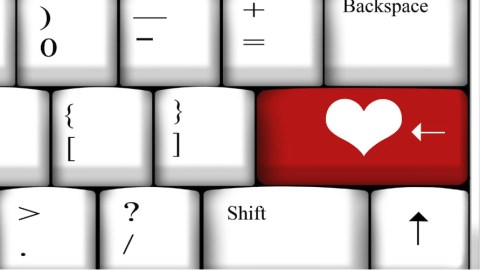Forget phone calls, millennials prefer to type their romantic messages

Image credit: Alga38 / Getty
Media naturalness is a theory of communication involving digital technology. In short, it states that face-to-face discourse is the most “natural” form of communication when compared to various other media: FaceTime, text message, e-mail, etc. The further you get from in-person interaction, the more difficult it becomes cognitively to maintain a “natural” connection. Digital communication is also susceptible to heightened ambiguity and a decrease in the physiological arousal which results from an interaction.
In short, media naturalness theory paints e-communication as inferior to voice-to-voice communication, which is itself inferior to face-to-face communication when the goal is making a personal connection.
Millennials, as you’re certainly aware if you’ve ever spent five minutes standing next to one, scoff at this idea.
Young people treat the telephone with caution. There are no second chances where live speech is concerned. There is no rough draft for a phone conversation.
New research out of Indiana University finds that, based upon analysis of language used and arousal generated, romantic e-mails are more effective for young people than romantic voicemail. The authors of the 2015 study, Alan R. Dennis and Taylor M. Wells, note that senders would “consciously or subconsciously add more positive content” to their e-mail messages, perhaps to compensate for the distancing effect of digital communication. They posit other reasons why e-mail appears to have surpassed voicemail on the intimacy scale, most notably that writing a message takes time and thought while leaving a message is often a haphazard one-take experience.
It’s no secret millennials dislike talking on the phone. Back in 2010, Ian Shapira of The Washington Post summed up the primary reason for millennial aversion to talk: control.
Young people say they avoid voice calls because the immediacy of a phone call strips them of the control that they have over the arguably less-intimate pleasures of texting, e-mailing, Facebooking, or tweeting. They even complain that phone calls are by their nature impolite, more of an interruption than the blip of an arriving text.
Young people treat the telephone with caution. There are no second chances where live speech is concerned. There is no rough draft for a phone conversation. And this is a generation that’s been trained to tinker, to make adjustments. Everything from their very first school essays to their latest Minecraft masterpiece involves chipping toward perfection not unlike a sculptor working with marble.
Improv, live acting, on-your-feet wit: These are not tools often found in the millennial utility belt. Instead, millennials value autonomy, or at least the illusion of autonomy. And what’s more autonomous when it comes to communication than being able to fiddle with and amend a love note to your heart’s content, and then send it off in a digital cloud of smoke?
The key here is we’re watching social adaptation in action. Something as straightforward and clinical as a single e-mail is now a preferred medium for affectionate discourse. And our evolving physiological response to digital communication is sure to continue bucking conventional wisdom in the near future.
Millennials have come of age in an era of massive social and technological transformation. That means their values systems include stark variances from what the business world is used to. IBM’s Jon Iwata says it’s time for companies to hop on board.
Read more at Medical Daily


